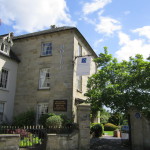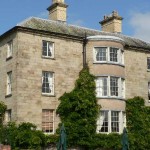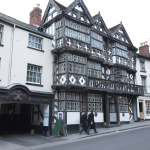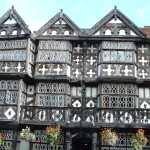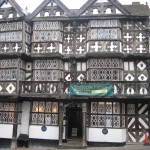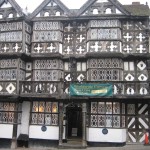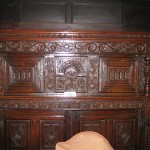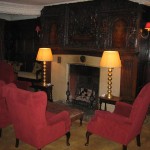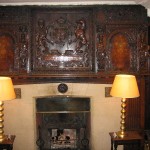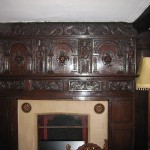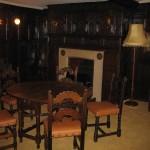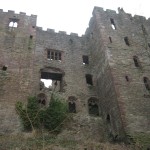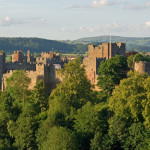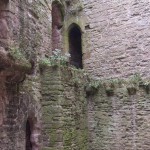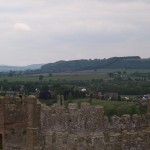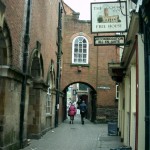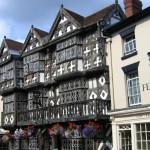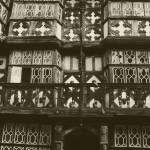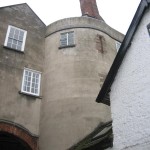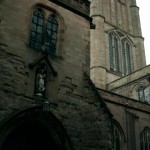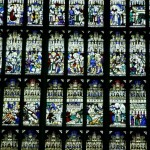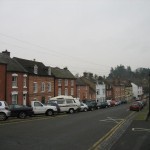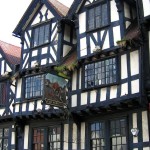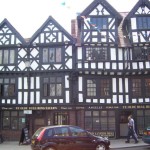Ludlow is a market town in Shropshire, England close to the Welsh border and in the Welsh Marches. Market towns in England have a fixed location where live farm animals are sold on a regular basis. It lies within a bend of the River Teme, on its eastern bank. The town of about 10,000 people is centered on a small hill. Atop this hill is the site of an intact ruin of Ludlow Castle and the market place. From there the streets of the medieval walled town slope downward to the River Teme, and northward toward the River Corve. Ludlow is near the Clee Hills, with the tallest point being 1,792 feet, and are clearly visible from the town
Ludlow has nearly 500 listed buildings.They include some fine examples of medieval and Tudor-style half-timbered buildings including the Feathers Hotel. We spent many weeks in Ludlow during the 1990’s usually staying at the Feathers. The local Rotary Club has held it’s meeting there for many years. Cocktails were served, during the social hour before the meeting, which was quite departure from Texas Rotarian procedures. We became great friends with Mr. & Mrs. Horton who ran the hotel. As you may gather from all the photos, we loved the Feathers.
A caste was built at the site of Ludlow, around the year 1085, to protect the Anglo-Saxon English from the Welsh. It also played a prominent part in the folk-story of the outlawed Lord of Whittington, Shropshire who many believe to be the inspiration for the Robin Hood legend. Each summer a major William Shakespeare production is staged in the Castle ruin. We had the pleasure of attending several productions in this sunning setting.
Just across lane from the Castle sits Dinham Hall. Dinham Hall had lastly served as a boys dormitory for about 20 students enrolled at Ludlow College. The Hall was on the market at a ridiculously low price (in addition, the dollar was very favorable against the British pound). I viewed this property during several business trips, there. There are several intriguing tales of Dinham Hall being haunted. At the time, I was negotiating to purchase the Ludlow based McConnel Ltd. which had a listed “Toll House” dating from the early 1500s on its property. Because of the many limitations on its use, I had the Toll House restored and then donated it to the City of Ludlow.
After completing the purchase of McConnel Ltd., I turned to negotiating for the purchase of Dinham Hall. Since it is also a listed property, the purchase would have included several restrictions which were not a problem for us. However, before the purchase could be completed. I became involved in the acquisition of a second English company.
Bomford & Evershed was a larger company and located near Shakespeare’s hometown of Stratford-upon-Avon. Since I knew that more time would need to be spent at Stratford, I called off the negotiations for Dinham Hall. This decision is one of my larger regrets in life. The Hall was later purchased and became a hotel.
- Dinham Hall Hotel
- Dinham Hall, Ludlow
- Feathers Hotel, Ludlow
- Feathers Hotel, Ludlow
- Feathers Hotel, Ludlow
- Feathers Hotel, Ludlow
- Feathers Hotel Palor
- Feathers Hotel Palor
- Ludlow Castle walls
- Ludlow Castle – view from the River Teme with Clee Hills in background
- Ludlow Castle interior court
- Ludlow Church Inn. Tavren
- Feather’s wood work
- Main gate in Ludlow town walls
- Ludlow St. Laurence Church
- Ludlow St. Laurence Church stained glass window
- Ludlow Street scene 1996
- Ludlow Bill Ring Inn
- Ludlow Bull Ring Inn directly across the road from the Feathers

